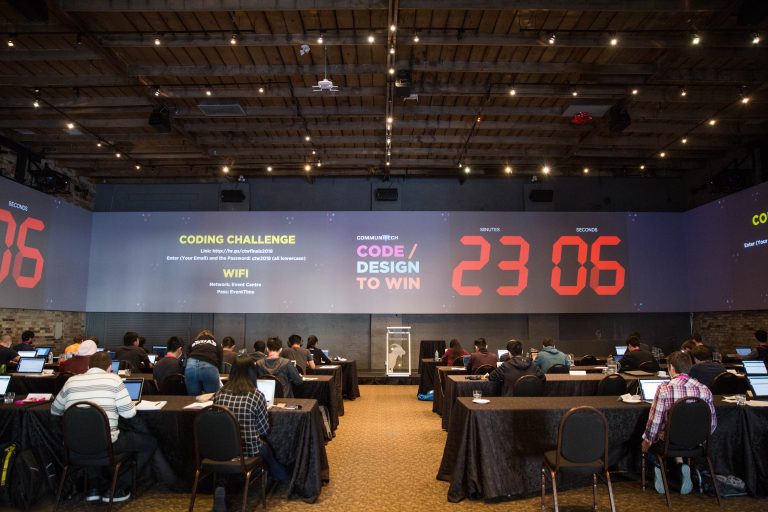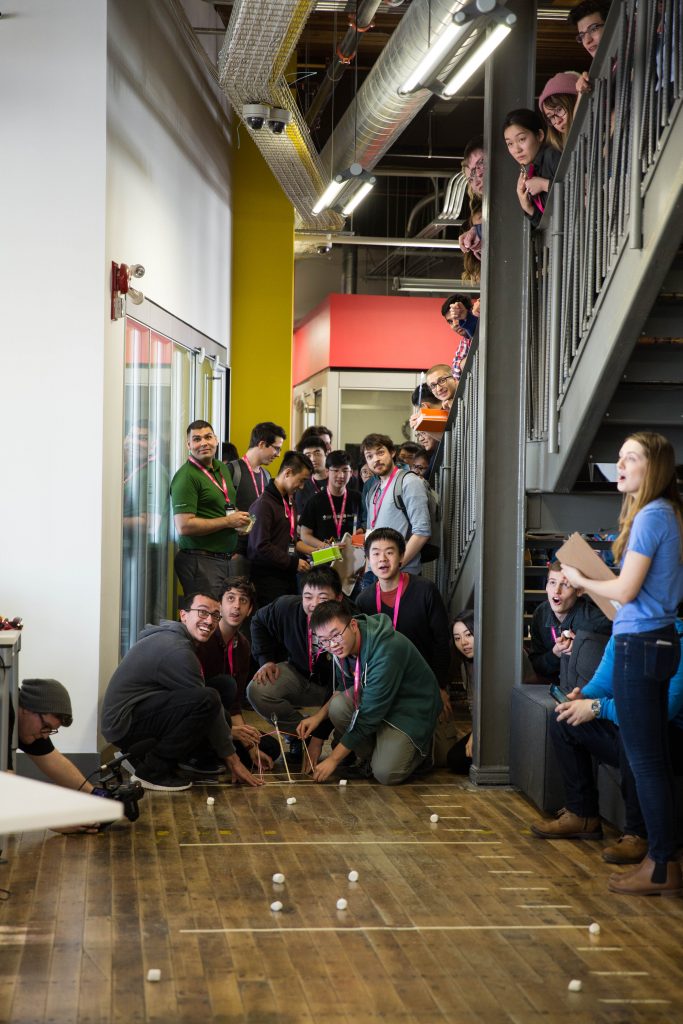It was an unprecedented result.
The third annual Code to Win/Design to Win challenge brought the best student coders and designers in Canada to Communitech this weekend.
In Design to Win, there was a winner Friday afternoon of the $5,000 first prize, and a winner of the $1,000 second prize.
But in Code to Win, 14 of the 50 coders tasked with solving a complex coding problem in under two hours finished the challenge with a perfect score of 450 points.
It came down to who finished the fastest, and William Wen, a first-year computer science student at the University of Waterloo, edged his nearest competitor out by only nine minutes to win the $5,000 top prize.
Rather than try to pick a second place winner, Communitech and the event sponsors dug deep and extended the $1,000 second prize to the other 13 finalists who achieved perfect results.
For Wen, known among his peers for regularly entering math competitions, his first-place result was a bit of a surprise: “I normally get beaten.” But he was glad to have succeeded in this contest, “because the prizes for the other contests are much smaller.”
The winner of Design to Win portion, Lucy Wang, who scored 14 out of 15 possible points, showed that software design can encompass the talents of many disciplines: she’s a second-year actuarial science and statistics student at UW.
"This is absolutely unbelievable," said Wang, while holding her giant cheque.
Wang said that her win has affirmed her intention to add a computer science major to her program, because of her interest in coding and programming.
That interest helped both Wang and Wen become one of the 75 students (50 in the Code challenge and 25 in the Design challenge) who made the short list for this weekend’s competition by vying with 927 other competitors in a preliminary round last fall. This weekend’s gathering was an intense, time-limited challenge, based on HackerRank software for the coders, while the event sponsors created the design challenge.

The clock winds down as students compete at Communitech’s Code to
Win/Design to Win event. (Communitech photo: Kelsey Vere)
It was a diverse talent pool, ranging in age from 18 to 28. Of the 75 finalists, 21 were women. Finalists came from 18 campuses in Ontario and seven campuses from as far away as the University of British Columbia (one competitor was a University of Toronto exchange student from Germany). Travel and accommodation were subsidized for out-of-town competitors.
Making possible those subsidies and the cash prizes was a diverse sponsorship group: e-learning software maker Axonify; vehicle history and valuation company CarProof; insurance giant Manulife; informatics and imaging company PerkinElmer; talent-search firm Terminal; wearable tech innovator Thalmic Labs; fintech leader TD Bank; hearing solutions provider Unitron; and Ontario’s Workplace Safety and Insurance Board (WSIB).
For the sponsors, Code to Win/Design to Win is a chance to meet some of the brightest coders and designers in Canada.
Samantha Estoesta, Outreach and Operations Manager for the TD Innovation Lab at Communitech, says TD has been at all three Code/Design events because Communitech reaches every school in Canada: “When we look at ways that TD is trying to become the bank of the future, a lot of that comes from making sure that we’re having the greatest, most innovative students come through our doors, and we can only get that from events like this.”
Chance Nguyen, Digital Marketing Manager of Unitron, has been at Code/Design for two years. “This is one of our favourite events that we sponsor. We get to meet some of the up-and-coming tech talent from either coast, and we get to intermingle with the top tech companies in this area.”
The sponsors hope to attract that national talent to the Waterloo Region tech ecosystem.
Caitlin Mulroney, Campus and Talent Operations Specialist with Thalmic Labs, said, “For us, being a born-and-raised Kitchener-Waterloo startup, we wanted to ensure that students all over Canada know that Kitchener-Waterloo is not only a place to start your career, but to continue your career.”
Michel de Blois, Director of Software Development for Axonify, said, “We think this attracts the top of the crop of students and we hope that when they are looking at a co-op term, they’ll look at Axonify.”
And, the sponsors hope the students will see the breadth of possibilities in tech.
Veronique St-Germain, Director of Talent for Terminal, said, “We want to encourage students to pursue career education in the technology field. We want them to know all the opportunities available to them locally.”
Angela Van Daele, Communications Director for Canadian Division Technology at Manulife, which has its Red Lab at Communitech, said the event helps Manulife “raise the brand.”
“We’re here to demonstrate that Manulife is not who you think we are, that we are a destination for tech. . . To this audience, who might not consider insurance as a sexy destination, we’re trying to show that we’ve got a lot to offer.”
Melissa Roth, Campus Engagement Co-ordinator for Communitech, said this third year of Code/Design was big: almost twice as many coders and designers took the preliminary challenge as in 2017. The aim is to sell the local tech ecosystem as a destination for emerging tech talent.
“Communitech runs an event like this because it helps us bring the top talent to Kitchener-Waterloo and it raises awareness for students about the opportunities that they have to build a career here in tech. In this system, there are opportunities for them to work in co-op jobs, internships, and post-grad, and for them to grow their careers here.”
While the judging of the code and design challenges was under way Saturday, the finalists broke for lunch and a team-building event that gave them a goal and a budget: build a device that would throw a marshmallow the farthest, with a budget of $420 in play money. That play money got you such gear as a rubber band ($10), a large popsicle stick ($20) or a “large sturdy box” ($250).
The result was an unlikely succession of rickety catapult- and trebuchet-like contraptions, that, to the groans and cheers of the dozens of black T-shirt-clad programmers and designers, launched marshmallows along a marked course, with the winner firing its load an impressive 40-plus feet, well past the final demarcation on the landing zone.

Students launch marshmallows from an
improvised device during a team-building exercise.
(Communitech photo: Kelsey Vere)
The best tech designs exceed expectations.
After the marshmallow toss — networking. The students lined up before the reps from the sponsor companies, hearing the virtues of fintech vs. e-learning, while building a custom Lego man at Manulife and playing giant Jenga at Unitron, as two-wheeled robot “Ollie” raced around underfoot, controlled by a Thalmic Labs Myo armband that was passed from student to student.
Code/Design is the kind of event that can help prepare a student for seeking employment, said Andrei Purcarus Craciun, a McGill University electrical engineering student, who has made the finals in all three Code to Win challenges, and was among the 13 to win $1,000 on Saturday.
“Aside from gaining experience in problem-solving, I also had the good fortune to participate in interviews with companies during the events.” He said that the interviews “helped me in getting experience with interviews and in obtaining my current position at Microsoft.”
Victoria Vandenberg, a global business and digital arts student at the University of Waterloo’s Stratford campus, was both a competitor and one of the 28 Communitech campus ambassadors working at campuses across Canada. As an ambassador, she “talked up” the Design to Win challenge on campus last semester, because “The Design to Win challenge was an awesome opportunity for my peers to go out and test themselves.”
Vandenberg says that making the Code/Design finals is an accomplishment for any student: “It’s a matter of pride to get in to this challenge. It’s also a validation of your skills. . . . I’m excited to meet other people who have the same interests and same passions as me, to meet and collaborate with other designers, to network with different companies, and foster a sense of community.”
The other winners were:
Design to Win, second prize of $1,000: Peter Liu, UW.
Code to Win, second prize of $1,000: Pak Hay Chan, UW; Andrei Purcarus Craciun, McGill; Nimesh Ghelani, UW; Paul-Andre Henegar, McGill; Kshitij Jain, UW; Hoang Phan, UW; Andrew Rock, UW; Ahmed Sabie, UW; Lucy Shen, UW; Shine Wang, UW; Farbod Yadegarian, UW; Jeffrey Zhao, UW; and Ilian Zhuravlev, Conestoga College.

